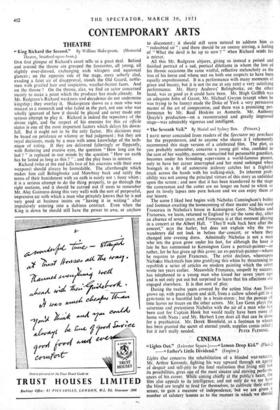CONTEMPORARY ARTS
THEATRE
OUR first glimpse of Richard's court tells us a great deal. Behind and around the throne are grouped the favourites, all young, all slightly over-dressed, exchanging arch whispers and equivocal glances ; on the opposite side of the stage, more soberly clad, exuding a faint air of disapproval, stands the Old Guard, noble- men with grizzled hair and suspicious, weather-beaten faces. And on the throne ? On the throne, alas, we find an actor concerned mainly to make a point which the producer has made ,already. In Mr. Redgrave's Richard weakness and decadence do not undermine kingship ; they overlay it. Shakespeare shows us a man who was miscast as a monarch and who failed in the part, not one who was wholly ignorant of how it should be played and never made any serious attempt to play it. Richard is indeed the repository of the divine right, and the respect of his enemies for this ex officio status is one of the most important factors which delays his down- fall. But it ought not to be the only factor. His decisions may be based on petulance or whimsy or bad judgement ; but they are royal decisions, made by a man with some knowledge of the tech- nique of ruling. If they are delivered falteringly or flippantly, with fluttering and evasive eyes, the question "How long can he last ? " is replaced in our minds by the question " How on earth has he lasted as long as this ? " ; and the play loses in interest.
Richard (who at the end kills two of his assassins with their own weapons) should always be formidable. The afterthought which makes him call Bolingbroke and Mowbray back and ratify the terms of their banishment with an oath is surely not ?. fussy whim ; it is a serious attempt to do the thing properly, to go through the right motions, and it should be carried out (I seem to remember Mr. Alec Guinness doing this very well) with the sort of purposeful, impressive air with which a man who privately knows that he is not very good at business insists on " having it in writing" after impulsively entering into a dubious contract. Even when the King is down he should still have the power to awe, or anyhow to disconcert ; it should still seem natural to address him as " redoubted sir " ; and there should be an uneasy stirring, a feeling of " What the devil is he up to now ? " when Richard sends for a mirror.
AU this Mr. Redgrave abjures, giving us instead a poised and finished portrait of a sad, poetical dilettante in whom the loss of his throne occasions the same wistful, reflective melancholy as the loss of his horse and whose seat on both one suspects to have been equally unprofessional. It is a performance with many moments of grace and beauty, but it is not (to me at any rate) a very satisfying performance. Mr. Harry Andrews' Bolingbroke, on the other hand, was as good as it could have been. Mr. Hugh Griffith was an adequate John of Gaunt, Mr. Michael Gwynn (except when he was trying to be funny) made the Duke of York a very persuasive master of the art of compromise, and there was a promising per- formance by Mr. Basil Hoskins as Aumerle. Mr. Anthony Quayle's production—on a reconstructed and greatly improved stage—was admirably vigorous and intelligent.






























 Previous page
Previous page